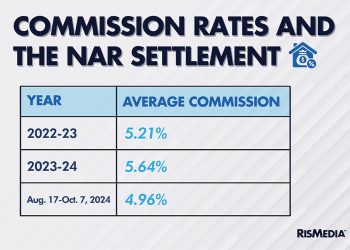
RISMEDIA, Dec. 3, 2007-As the mortgage and real estate industries face unprecedented times, homeowners could very well be left to pay the bills, literally. Mortgage companies are going out of business or declaring bankruptcy every day. When that happens, their assets can be frozen, which means they cannot transfer any funds, including the funds they owe on behalf of homeowners for hazard insurance (and other types of insurance) and real estate taxes.
Most homeowners do not receive confirmation of payment of insurance or real estate property taxes. The assumption among them is that they pay the monthly escrow amount and never need to consider those items. However, recent examples have shown that might not always be the case. There are a few simple steps homeowners can and should take to verify payment of their escrowed items.
The current market circumstances provide real estate professionals an opportunity to contact previous buyers as an advocate with valuable information. A simple phone call explaining the circumstances and proactive steps homeowners should take could seal your customer relationship for years to come.
Below are some specific best practices you can share with your buyers to help them be more knowledgeable homeowners and give them guidance if their mortgage company goes out of business.
Insurance
While the primary purpose of insurance is to protect the interests of the lender, having a lapse in hazard, flood, wind and other types of insurance could have a significant impact on homeowners, especially if they have equity built up in the home. If an insurance payment lapses, carriers will immediately cancel the insurance policy.
Homeowners should proactively monitor their policies. Most insurance companies provide policy information online. If not, the insurance agent should be able to access the information. Either way, it is easiest if homeowners have their policy numbers, but if they do not, insurers have other methods of locating the policy information. Using the Internet or a phone call, in less than five minutes, a homeowner can confirm whether the insurance premium has been paid.
If a homeowner finds out that a premium has not been paid, there are two options. The homeowner can contact the mortgage company directly regarding the payment or can request the insurance agent do it on his/her behalf. It is important to remind your homeowners to keep their policies’ expiration date in mind because once the policy expires, they will have no protection against losses.
If the insurance is not being paid and the mortgage company is not helpful, the individual can also contact the state Insurance Commissioner’s Office or other agencies that govern insurance. Homeowners should contact the office in the state where the property is located, regardless of where the mortgage company is located.
The best advice to give homeowners if the deadline is approaching for the insurance to be paid, and they fear it will not be paid or not paid on time, is that they make the payment, document it and then seek reimbursement from the mortgage company. This prevents the insurance from being cancelled.
In states like Florida and Louisiana that have experienced significant damage from hurricanes in recent years, it has become very difficult to get insurance. If a homeowner’s insurance is cancelled, it will be even more difficult to get a new policy as that person will be moved to a higher risk category due to the lack of payment. This means that if they can get a new policy, they will be paying more for it. This is just one more reason why it is important to remind your homeowners to monitor their insurance payments.
Real Estate Taxes
Real estate taxes are not as critical as insurance from a payment perspective because there is no threat of cancellation; however, if taxes are not paid, the homeowner will be assessed penalty fees as a result of the delinquency. Eventually, a tax certificate can be held against the property, and, as a last resort, the property could be auctioned to cover the delinquent tax bill. While this is a lengthy process, legal fees are incurred throughout each step for which the homeowner could be responsible. This becomes very costly. Plus, the longer the process takes, the more difficult it becomes to unwind.
Most tax authorities provide information online, so a good recommendation to your homeowners is to go online to confirm payment of real estate taxes. However, if the particular taxing authority does not provide this information online, homeowners can contact them via telephone. Suggest that they have their tax folio numbers, parcel numbers and/or legal descriptions available when calling.
Again, if a homeowner fears the taxes are not being paid, it is best to recommend that the individual pay the bill and keep record of the payment to seek reimbursement from the mortgage company. The reimbursement process is a common, well-established process with mortgage companies, and it should be rather painless as long as the homeowner has good documentation.
Principal Balances
It is common practice for mortgage companies to buy and sell loans. A typical 30-year mortgage could be owned by several different companies, and this is even more common today as many mortgage companies go out of business. When a loan is sold, the borrower will receive a letter with the change notification and new information on where to send the payment.
It is critical that the homeowner ensures the principal balance and escrow balance are correct when his/her loan is sold to another mortgage company. Point out to the homeowners that they should have received an amortization schedule with their closing documents. They should compare the outstanding principal balance that the mortgage company has to the principle balance on the amortization schedule to ensure its accuracy.
First-Time Buyers
When you are working with new buyers, it would be beneficial to recommend that they record the following information for their new home:
Tax folio number
Legal description
Homeowners insurance policy number
Also, they should keep copies of all this information. The originals should be kept in a safe spot; the copies should be kept in an easily accessible second location outside the home.
The good news is that due to the seriousness of delinquent payment for taxes and insurance, escrow accounts are governed by state and federal laws. Although very stressful and cumbersome for the homeowner, make your homeowners aware that the government will step in and take over the management of the escrow account if the mortgage company does not.
Acting as an advocate during this time could have lasting benefits for you and your business. This is just one more way for you to maintain contact with your homeowner and establish customer retention strategies for your business.
Sylvia Ponce is senior vice president of operations for Fidelity National Information Services’ Home buyers Financial Network (HFN). With more than 18 years experience in mortgage lending, she is responsible for internal and external management of all loan production operations. HFN enables real estate brokers to own and control their own mortgage companies. HFN manages the set up, staffing and licensing processes and then provides end-to-end mortgage fulfillment services for the in-house mortgage company.
For more information, visit www.fidelityinfoservices.com.










